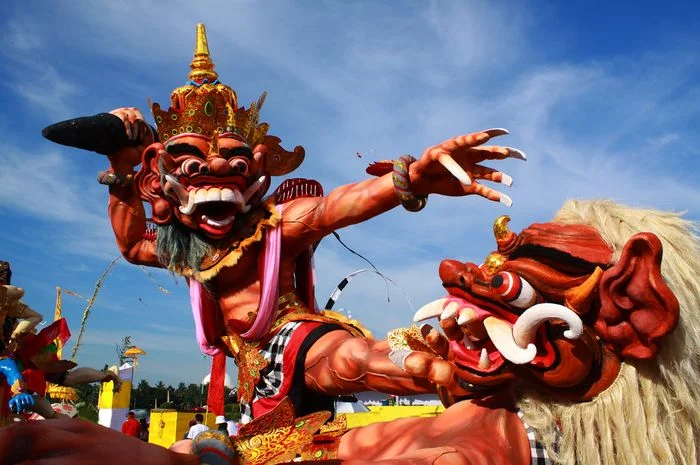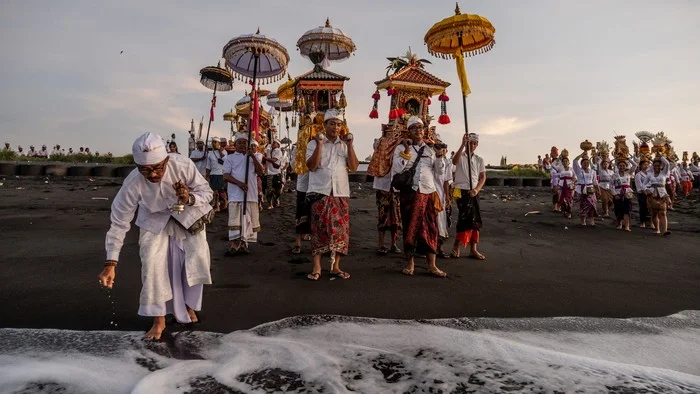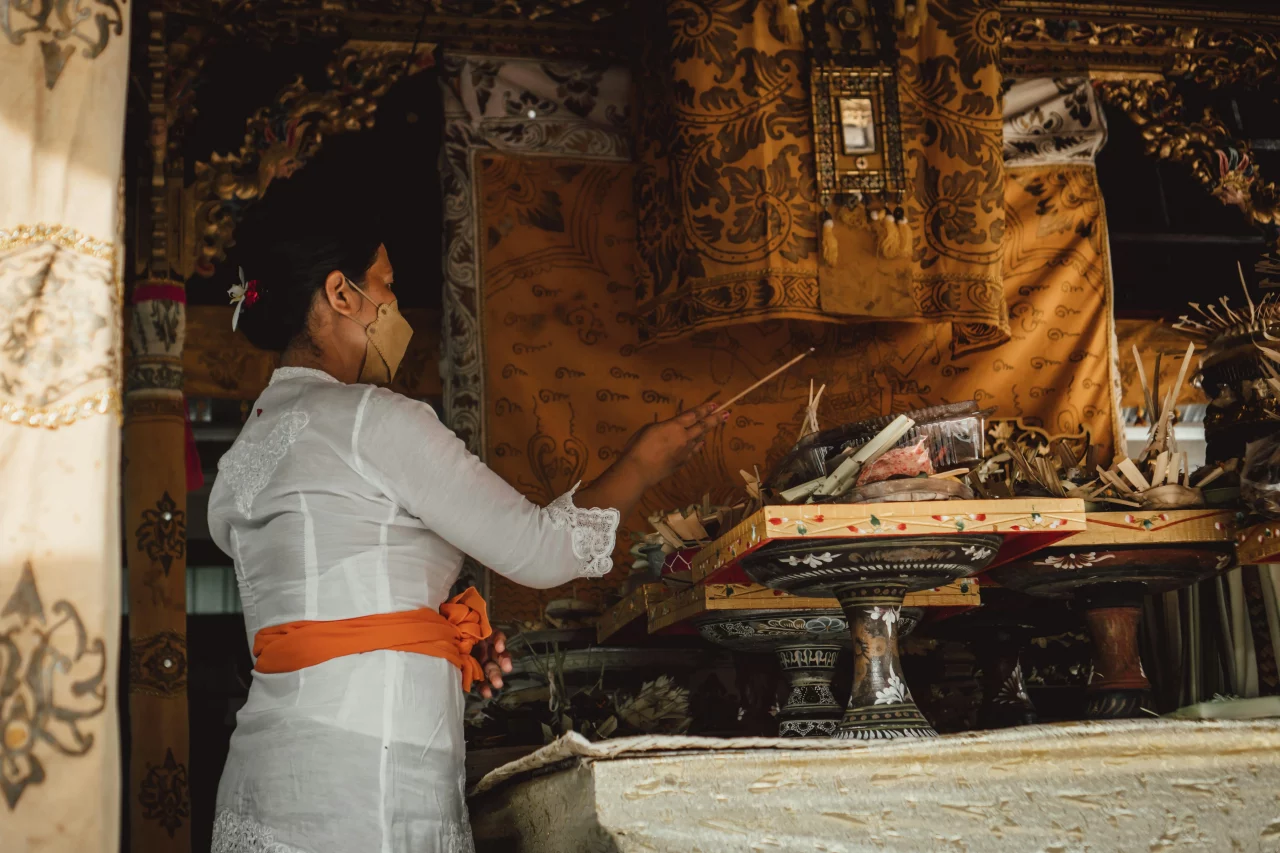In diverse corners of the world, various cultures and religions have distinct ways of celebrating the arrival of the New Year. While the Chinese observe the Lunar New Year and Muslims commemorate the first of Muharram, in Bali, the Hindu community welcomes the New Year through the sacred ritual known as Nyepi.
Widely recognised as the “Day of Silence,” this exceptional occasion is a period of profound tranquillity and introspection. In this article, our goal is to provide you with a comprehensive insight into the historical background, ceremonial practices, and the regulations associated with this cherished Silent Day in Bali, offering a deeper understanding of one of the island’s most revered traditions.
What Is Nyepi?
For the Balinese, Nyepi represents a significant Hindu celebration that marks the beginning of the New Year according to the Saka Calendar, a traditional Hindu calendar. Nyepi’s precise date varies each year due to astrological calculations, but it typically occurs in either March or April.
In contrast to some vibrant New Year celebrations in other cultures or religions, the Balinese observe Nyepi with complete silence, fasting, and meditation. This sacred day provides an opportunity for individuals to deepen their spiritual connection with Ida Sang Hyang Widhi Wasa, the Supreme God in the Balinese Hindu belief system. Beyond fostering spiritual connections, Nyepi also serves to cleanse the island from the previous year’s misdoings and bad omens, ushering in a new year filled with love, patience, kindness, and positivity.
As a result, on this Silent Day in Bali, the entire island comes to a standstill for 24 hours. All lights and sounds are turned off, shops are closed, and all traffic as well as activities come to a halt. Every resident, including those who do not practise Hinduism, is required to stay indoors in their homes, villas, or hotels, maintaining complete silence and avoiding any disturbances.
The Ceremony of Nyepi


The ceremony of Nyepi encompasses several key rituals and events, each playing a vital role in the observance of this unique Balinese tradition.
1. Melasti Ceremony
The Nyepi rituals begin with the Melasti ceremony, which unfolds three to four days before Bali’s Silent Day. This important purification ritual takes place at the Pura temples that are located near the sea. During the Melasti ceremony, thousands of Balinese individuals, all dressed in white attire, partake in a magnificent procession towards the ocean. They carry sacred objects from the temples to the sea, where these items undergo cleansing and purification. This symbolic act also represents the purification of one’s mind and soul.
2. Bhuta Yajna Ritual & Ogoh-Ogoh Parade
On the eve of Nyepi, a significant ritual called Bhuta Yajna, also known as Pengerupukan, is held to dispel negative elements. This ceremony takes place after sunset, typically around 6 pm. During this event, Balinese people participate in a procession through their streets, wielding fiery torches and energetically playing traditional bamboo bells known as kulkul.
The highlight of this ritual is the Ogoh-Ogoh parade, where enormous monster effigies are carried through the streets. Accompanied by lively music and dance, the parade creates a vibrant and festive atmosphere. Following the parade, all the Ogoh-Ogoh effigies are set ablaze, symbolising the expulsion of demons and negative forces from the community.
3. Nyepi
After the spirited Ogoh-Ogoh parade concludes, Nyepi itself arrives. On this day, Bali enters a profound and reflective silence. The streets become empty, businesses are closed, and even the airport suspends its operations. No one is permitted on the streets, and any noise or lights are maintained at a minimum. Nyepi is a day devoted to self-reflection and meditation, providing an opportunity to contemplate the past and envision the future.
4. Ngembak Agni or Labuh Brata Ritual
The day following Nyepi, known as Ngembak Agni or the Labuh Brata Ritual, signifies a return to everyday life. On this occasion, Balinese Hindus visit their families, neighbours, and relatives, seeking forgiveness from one another. This practice fosters harmony and paves the way for a fresh start in the upcoming year.
Interestingly, during this time, they also celebrate the Omed-omedan festival, where unmarried Balinese youths are being paraded and engaging in playful interactions, including pulling each other, hugging, kissing, and being doused with water. This tradition is believed to strengthen the bonds of love among the community’s residents.
Dos and Don’ts during Nyepi


On Bali’s Silent Day, Balinese Hindus engage in meditation, prayer, and silent time at home with their families, transforming the island into a serene sanctuary with a complete pause in activity. Consequently, tourists and non-Hindus are expected to participate in this collective observation by adhering to the following guidelines.
- Refrain from going outside
- Avoid speaking loudly, shouting, or making disruptive noises
- Minimise the use of lights and keep curtains closed
It is essential to note that these prohibitions are very strict and non-negotiable. There will be local guards, known as pecalang, patrol to ensure strict adherence to these rules. If you are found violating the rules of Bali’s Silent Day by pecalang, you may face consequences such as arrest and penalties, including fines, customary sanctions, or even legal proceedings.
However, fret not; if you’re staying in a hotel, you will typically find a variety of activities available to keep you occupied, and you won’t be left in total darkness. Low lighting inside your hotel room is permitted at night, as long as curtains are kept closed. However, turning on lights for your hotel balcony is not allowed. Furthermore, hotels provide meals during the 24-hour lockdown. Access to television and radio in your hotel room is available, but remember to keep the volume at a minimum to avoid disturbing others. By adhering to these local wisdoms, you will contribute to a harmonious experience for everyone during this sacred day.
When Is Nyepi 2024 and What to Prepare?
Nyepi in 2024 falls on Monday, March 11th. It commences at 6 am and concludes 24 hours later, at 6 am on March 12th. If you want to fully immerse yourself in the entire procession of the sacred Silent Day in Bali, it’s advisable to arrive at least a week before Nyepi.
For the optimal experience, we also suggest staying in Jimbaran. It’s located near Melasti Beach, one of the central sites for the Melasti ceremony, and also hosts the Ogoh-Ogoh parade, a major highlight of the celebrations. Therefore, it can be said that you’ll have the opportunity to witness the parade right near where you’re staying.
In the days leading up to Nyepi, meticulous preparations are crucial. If you’re staying in a private villa, confirm whether food and meals are provided during the Silent Day in Bali. If not, stock up on groceries well before Nyepi, as supermarkets and shops will be closed during the observance. It’s also advisable to prepare most of your meals on the day before Nyepi, as cooking is restricted due to the need for minimal noise and light usage. Additionally, bear in mind that, as Nyepi is a major public holiday in Bali, numerous shops and businesses will remain closed for an entire week leading up to it.
Furthermore, since going outside is prohibited on Silent Day in Bali, it’s a perfect time to relax all day in your room. You can spend the day meditating, watching movies you’ve downloaded beforehand on Netflix, or enjoying some quiet reading, ensuring a serene and contemplative experience.
Conclusion
In conclusion, Silent Day in Bali transcends mere cultural observance; it represents a spiritual odyssey, providing an opportunity for rejuvenation and introspection. Experiencing Nyepi in Bali is not merely about witnessing a cultural event; it’s about delving into the spiritual essence of the island. The ceremonies leading up to Nyepi, Bali’s Silent Day itself, and the rituals that follow contribute to a profound and transformative experience. For those considering living in Bali, participating in Nyepi offers a meaningful glimpse into the deep-rooted traditions that make this island an extraordinary and spiritually rich destination.








One comment
Owehems
November 20, 2024 at 12:36 am
Side Effects include nausea, dizziness and headaches Priligy Successful use of ECMO in adults with life threatening infections